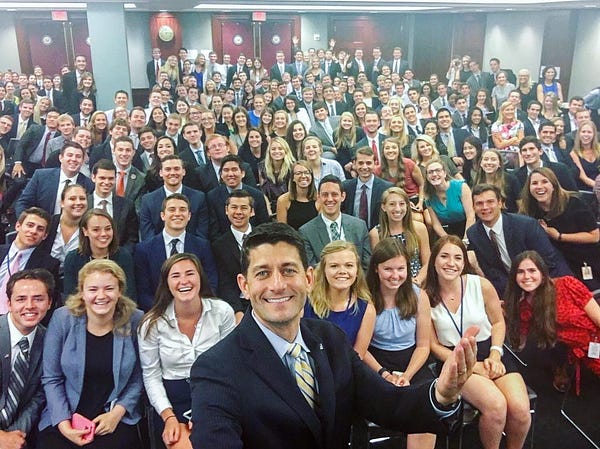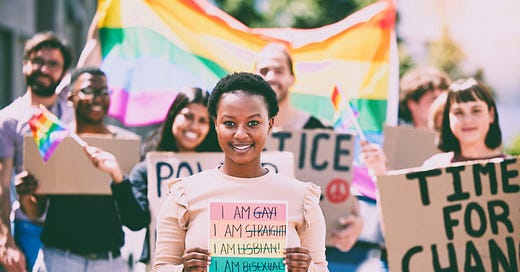The Miseducation of Woke
Bad faith conservatives did to "Woke" what Baby Boomers did to Facebook.
We are all human. Shot of a group of young people protesting for LGBTQI+ rights. Shutterstock.
A hollowed-out version of the party of Lincoln, which formed out of Southern Strategy and the Reagan Revolution now relentlessly pushes plutocracy while dividing Americans. This iteration of the party is notorious for its modern demographic challenges. Many argue it is not a challenge, but intentional.


The term “woke” has become a weapon for conservatives to attack Democrats and left-leaning Americans as cultural authoritarians. In actuality, “woke” became popular again in the late-2000s with an Erykah Badu song:
But “woke” was becoming a mainstay in popular culture and politics by the mid-2010s, despite the term being much older. For example, there was a popular song by the artist Childish Gambino also known as Donald Glover, the talented creator of the series Atlanta:
Woke became a popular term used by young people to describe an act of gaining enhanced knowledge about deep-seated national failures regarding racial identity and demographic inclusion. It is also characterized as a general openness to acknowledging and stating the ways in which white supremacy has mired America’s ability to live up to its democratic potential. The awakening coincides with the fallout of America’s unwarranted invasion of Iraq, a radicalized Republican Party squeezing the middle class while openly harming minority Americans through unequal economic distribution and voter suppression, as well as revelations regarding how women have been sexually abused and attacked in the workplace by powerful actors. The excesses of neoliberalism and the near decimation of the New Deal state have deteriorated opportunities for working-class Americans, while at the same time, advances in communications technology have made it easier for them to be manipulated and abused through tribal demagoguery.
In recent years, conservatives have jumped on “woke” to paint their political opposition as obsessed with condescending attempts to socially engineer people’s behaviors and customs. They are intrinsically speaking to older Americans (and less educated ones), who shed anti-Black attitudes, antisemitism, homophobia, Islamophobia, xenophobia, and other forms of hate and willed separation. This demagoguery is effective in all American communities.
For one, the Republican Party’s campaign to dehumanize the LGBTQI+ community has been especially horrific and vicious. There is homophobia throughout a variety of Americans and it is most active in the ultra-right-wing Christian communities.
Redbone by Childish Gambino, live on The Tonight Show Starring Jimmy Fallon:
Young people can tend to overlook the short period of time in which massive transformations occurred in America. It’s nice to reflect on how regions once underdeveloped for centuries are now turning into condos, offices, and commercial centers in a matter of months. Changes to the landscape happen faster than changes to emotions, thoughts, memories, communal ties, subliminal views of hegemony, beauty standards, and the equalized distribution of institutional knowledge and advantages to once hyper-marginalized groups.
While taking some grace to understand the rapidity of America’s historical transformations since the rise of Motown (even since the release of Purple Rain), it must also be stated that there is historically present opposition1 to “wokeness,” or better stated, the way in which youth culture accentuates America’s midcentury Rights Revolutions and intertribal empathy from top to bottom.
A lot of scholarly conservatives trace their thought patterns to two figures, Edmund Burke and William Buckley Jr.
Burke was alive during the French Revolution and was a member of the British Parliament (MP) when the populist revolution unfolded in France. He became an “Old Whig” as the Revolution turned dark. This was a faction of the British Whig Party that valued the rule of law over the people’s formation of the government. Before the Revolution, Burke held categorically classical liberal views. He supported limiting the monarchy, increasing free trade, and fostering a tenuous interest in the American Revolution. For Burke, disagreements between authorities and populations are to be sorted through documentation rather than warfare and collective people’s revolt. So when morbid scenes and stories came out of the Terror in France, Burke continued to move to the conservative end of the political spectrum out of the shock and, likely, fear.
History is littered with instances of moral and popular inclinations transforming into a launder for the darkest iterations of humanity. Burke’s critique of the French Revolution comes out of his opposition to the way events unfolded since it was based on “the Rights of Man,” something too general in his view. Burke sees government forming not through terms like “liberty,” but through traditional institutions. The abstract nature of the former, he would argue, is too general and can potentially be used as a political cudgel or lead to absolute chaos at the hands of the people.
Edmund Burke can be an enigmatic figure in terms of his political leanings. It is a testament to the intense political uproar that characterizes the late stages of Europe’s early modern period.
"It is better to cherish virtue and humanity, leaving much to free will . . . than to attempt to make men machines and instruments of political benevolence. The world as a whole will gain by a liberty without which virtue cannot exist."
-Edmund Burke
Similarly, William Buckley is seen as one of the modern founders of today’s libertarianism and conservatism. He founded the National Review publication, but many argue that he attempted to apply an intellectual sheen to stances that were calling for pausing or limiting government activity meant to alleviate poverty and racism. Buckley is crafted as the intellectual godfather of the modern right as he connected anticommunism with traditionalism. Buckley characterized himself as a libertarian and a conservative.
Though initially opposed to a federal solution to the ongoing authoritarianism in the southern states, by 1965, he shifted his original views on Civil Rights and programs addressing racial gaps throughout his tenure on the planet. He often debated skilled and well-versed opposition on his television show, Firing Line, and in academic settings. Despite empowering the ability for regressive tribalism and irrational anti-government ideology to become a latter-century political machine, one could assume Buckley would balk at the state of contemporary conservative ideology.
Buckley expressed a lot of controversial, and elitist, opinions regarding human rights for marginalized people and the role a democratic government can have in incentivizing uplift for people who are not wealthy. But many also argue he was intellectually agile and able to backtrack and evolve.
Buckley and Burke both emit an intellectual tradition that, arguably, digests the excesses of Machiavellianism after swallowing a dark truth that the business of government is inherently built on retaining power through hidden agendas as well as the consistent examination of potential outbreaks of humanity’s darkest impulses.
"I am not one of those who think that the people are never in the wrong. They have been so, frequently and outrageously, both in other countries and in this. But I do say that in all disputes between them and their rulers, the presumption is at least upon a par in favor of the people."
-Edmund Burke
It can seem that conservatives have a darker view of humanity, which is why they view attempts to engineer the best behavior from a population (through law or memory) as disastrous because it is always serving a particular, singular agenda that inevitably takes the freedoms of another.
Hence, conservatives love the quote:
“Every great cause begins as a movement, becomes a business, and eventually degenerates into a racket.”
For many in the conservative political world, this is applied to Civil Rights as it is argued that the moral urgency of racial inequality is outdated. In this logic, the racial justice pushes of today are really acting as a cottage industry within political messaging where calls for tribal harmony and justice only fuel a homogeneous group of left-leaning power brokers working to hinder their right-leaning counterparts for gains that only benefit a small homogenous group. (This logic requires one to view the majority of left-leaning Americans as not acting independently, but, as mere puppets.) Hence, the nihilists within Trumpism felt no shame in myopically treating the rights of others like a game. This was built into modern conservatism’s institutional and intellectual memory.
Buckley often questioned agendas surrounding the postwar American government's massive domestic expansion, particularly regarding codifying rights, while also supporting right-wing regimes in other nations. The crux of today’s conservative ideology is that government should never become too powerful or it can become a tool utilized for power struggles only impacting an elite class within society. This ended up happening anyway but the solution is building more safeguards and funding sectors for better results rather than tearing it all down by not raising the debt limit.
To be fair, Buckley did spend time in the Central Intelligence Agency (CIA) and was familiar with the depth of ongoing hidden agendas. For Burke, the French Revolution saw the “Reign of Terror” form out of the same energy that was calling for “the Declaration of the Rights of Man.” However, the fate of French royalty was enough for his disdain.
Understanding the thought patterns and intellectual history of modern conservatives can help young people gain a better grasp of the good faith critiques and concerns some have over young people’s moral awakening.
This is not to say that parts of the right-wing aren’t motivated by hate. However, it is an examination of a governing ideology (pushed often by working people) that doesn’t connect with its supposed benefactors. It adds connective tissue to the “woke” demagoguery.
Throughout history, young people’s idealism and dynamism have been utilized by powerful entities to do horrible things. The Cultural Revolution in China during Mao Zedong’s regime was an attempt by him and his orbit to evade political consequences for failed projects by weaponizing the nation’s youth:
Easy Rider (1969)
These arguments are not paid attention to nearly as much by the demagogues who scream woke in their columns and on television.






